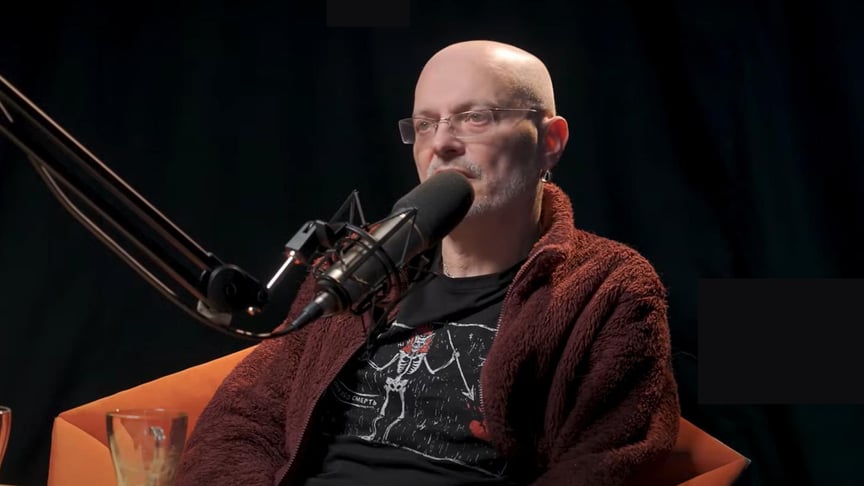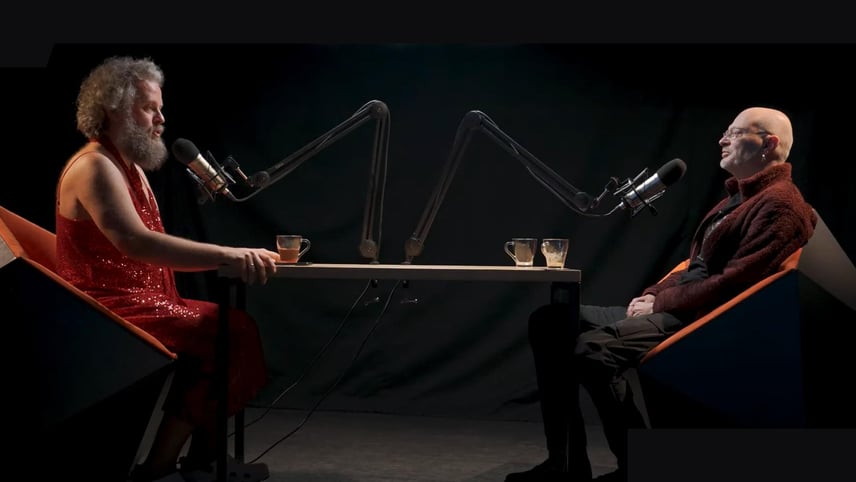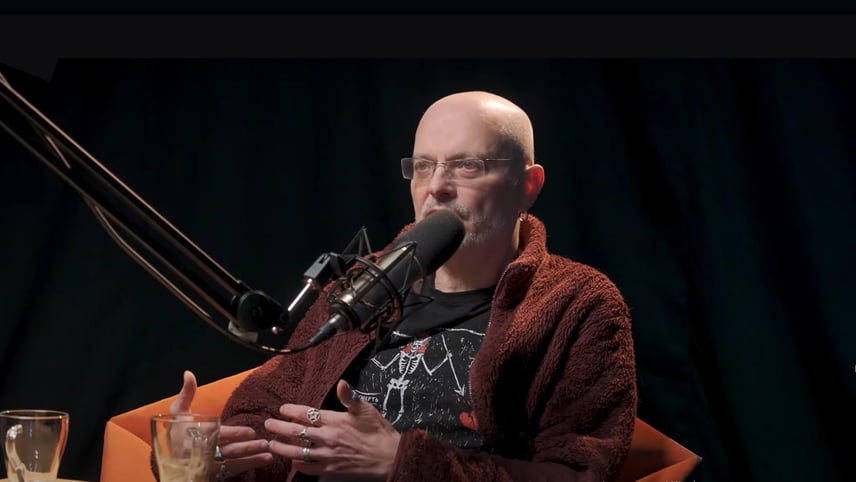"Yulia lost without me." Alexey Kovzhun discusses working with Tymoshenko, the tank in Moscow, Azov, and songs by Tsoi.

About the 1980s
It was a moment of rejecting the existence of this terrible Soviet civilization in a broad sense. I later learned this term (we didn't know it then) — internal emigration. This means you live where you live, but you simply do not participate in their institutions, do not take part in their rat race, or in some career pursuits. Only occasionally did I have to take on an official job when the local officer would come and say: "You have two weeks, or you'll face two years for being a parasite." So, I either worked as a loader in a store, or my favorite job was as an ambulance attendant, which, by the way, turned out to be very useful in terms of understanding people.
My parents were, of course, worried, because a man should have a job: "You were interested in chemistry. Why didn't you finish university?" I said, "Because I was expelled by the KGB and sent to the army for re-education — it didn't help. And I realized, what chemistry? In our university, we had two teachers who taught in Ukrainian. The author of the textbook on analytical chemistry taught in Ukrainian because he didn't care. And Chervinsky taught the history of the CPSU in Ukrainian. He said, "You are not chemists, you are Soviet chemists." And this thought troubled me. To hell with that chemistry if it's Soviet.
I recently read something from one of my peers that went like this: we thought we were fighting together or somehow opposing the Soviet power, but in reality, we underestimated that it was just a version of Russia.
About Subcultures and Construction Battalions
In the KGB protocols, I was noted as a mysterious hippie-pacifist. Although I was not a pacifist.
In the Soviet army, I never saw a weapon because, like all unreliable individuals, I was sent to a construction battalion. It was essentially a form of quasi-military slavery. I served with people who had been in prison, and they complained that prison was much better, freer, and more pleasant. And no one messed with your mind, unlike in the Soviet army. So even if I had been a pacifist, the construction battalion was okay.
At some point, I considered myself a punk because I loved psychedelic music, and we all smoked marijuana at that time. This is something I can talk about — even my parents know that I smoked marijuana back then. Now, unfortunately, I've outgrown that. But I also loved some Sex Pistols. On one hand, it was peace & love, and on the other — hate & war. And somehow, it was quite comfortable.

About the Russian Underground
Once, the late Sasha Lipnitsky came to visit. He was one of the cultural traders in Moscow, a bassist in "Zvuki Mu," and did a lot for the existence of this underground culture. He came to Kyiv in the early 2000s, hugged us, and thanked us for not losing our minds. I asked, "In what sense?" He replied, "Well, because everyone else has lost it." Then we started counting the names over a drink. Tsoi — died, Mamonov — lost it, Letov — lost it. So, basically, everyone.
But I understand that in the aggressive Russian environment, there was no room left. Because the Russian environment turned out to be much more aggressive than the Soviet one.
I remember when I returned home, and I was given the first Doors album and the 81st album by King Crimson to listen to. I had these two records under my arm, walking down Khreshchatyk, and at the central grocery store (across from the Central Department Store), there was a sign that read: "Communism = Soviet power + electrification of the whole country." And I realized that I was a bearer of absolute truth. Because I had great music, while everyone else walking around just reads this or sees it — they're all fools. In modern Russia, this is impossible.
Since around 2014, from Russian music, you could listen to some Tsoi, but now that's also impossible. I can't imagine it. I still have the records because they are part of my biography, part of my teenage culture, but I can't picture a moment when I would be with friends over a drink and say — let's put on Tsoi. It feels strange.
It's also quite funny when people ask: "What do you think, would those you knew be with us or against us?" I am sure that Tsoi would have been a star in South Korea or anywhere in Asia. And he would definitely speak out against Russian aggression. Even without a séance, I can know that for sure. Because he was different; he didn't fit into that Soviet narrative. And later, he didn't fit into the Russian narrative either. He was a separate entity. But again, music in Russian — well, no, sorry, not at all.
About the Ukrainian Pop Scene
Unfortunately, the Ukrainian pop scene that I experienced was shameful. For instance, I discovered "Kobza," "Smerichka," and Yaremchuk quite recently, as sad as that sounds.
UT-1 was generally a kind of a horror sanctuary where trams came to die. Where some fossilized uncles and aunts howled something completely outdated in terrible lighting. It was very unsexy. I believe UT-1 owes a lot to the Ukrainian nation. They thought they were creating a sanctuary like that, but in reality, they made Ukrainian culture unsexy and unfashionable. They contributed to this.
"Territory A"? It was perceived as something unserious, made on the fly. And, let’s say, I still feel sorry about it. I remember how my good friend Tolik Veskyarsky wrote a completely brilliant hit. He wrote it in protest against the poor-quality music that was on "Territory A." This song still plays in my head. "Love me, Natalia." Absolutely brilliant, "I don't need that Australia, we'll live in the UNR, love me, Natalia, I beg you." And I said, "Bro, let’s make this a hit." He replied, "No, I wrote it in the back seat of a taxi while going to Lesnoy Massif, and it’s just a joke." I said, "This is not a joke; this is a hit." — "But it's only on three notes." — "So what? How many notes are in I Feel Love by Moroder?"
So my pop sensibility told me that this could have been a brilliant hit that would be relevant now, and it would have made it to the top of "Territory A," but we still didn't feel that it was real. We had a sense of homemade artistic amateurism.
About Freedom, Upbringing, and Trauma
Complete freedom means: I want to go to the bathroom, I can sit down and take a dump. Upbringing tells you — that's not allowed. And this gives you a certain trauma because something is being forbidden. And that’s normal.
Moreover, there are distortions. Recently, there was a broad discussion in this elderly Facebook about misogyny and the objectification of women in the advertisement of the Third Assault Brigade. At the same time, I understand that those who made this advertisement bet on the fact that there would be discussions. And they had a trump card — they said that actually all the women featured there are the wives of soldiers, and some of them even serve themselves. But progressive women were somewhat aroused by this. As always with advertising, especially recruitment advertising during a full-scale war, if it works — step back, don’t get in the way. But let’s talk about it. And I imagine how much irritation this causes among the military. And this is excessive. But again, this is part of growing up, part of transitioning into a civilized space where there are traumas, some of which are useful, like the prohibition against shitting under fences or smoking on planes.

About Tsoi's Songs on the Streets
This annoys me. When musicians played Russian music after 2014, my good friend and colleague Kostya Batovsky would approach them and toss them five rubles — he always had some Russian coins with him. This was his personal protest. After the full-scale invasion, the war came home to everyone. And Russian music on the streets is now a political statement, and a very bad one at that.
What’s Wrong with Russians
I had an interesting conversation with Ukrainian artist Oleg Tistol, who said he grasped this national code, if I may say so, about a nationless population, about the Russians, in the Soviet army. I am very grateful to him. He gave me such thoughts. I told him: "I understand that they are not quite human, and that sounds terrible. This is absolutely some kind of Nazi story, where they are people but not quite." I said: "It’s hard for me." He said: "I have a formulation. They lack the qualities that distinguish a human from inhuman